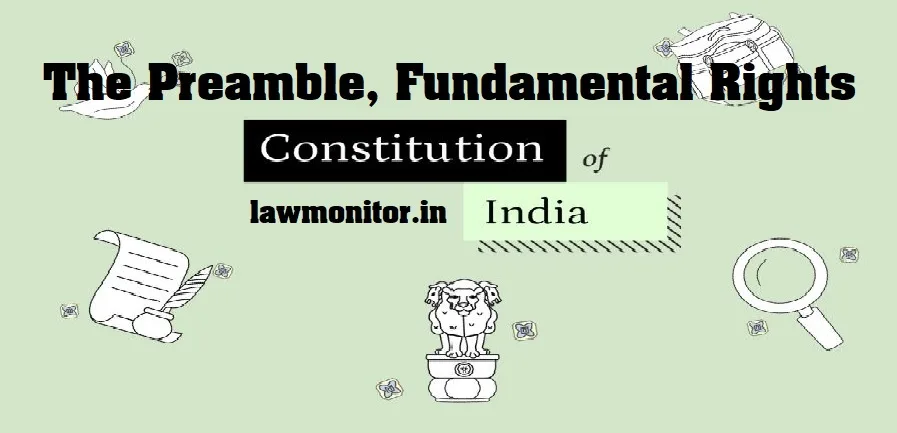Like in many other countries (e.g., US, South Africa, and so on), in India too human rights are rooted in the Constitution. The Indian constitutional human rights framework involve the following parts :
- The Preamble,
- Part III of the Constitution containing the Fundamental
Rights provisions, - Part IV offering the Directive Principles and
- Part IV(A) consists of the Fundamental Duties.
Read First 2 Parts here: CONSTITUTIONAL FRAMEWORK AND RELATED LAWS IN INDIA – The Preamble, Fundamental Rights
3. Directive Principles
Articles 36-51 in Part IV of the Constitution lay down the guiding principles of governance for the State are called the ‘Directive Principles of State Policy’.
Salient Features:
- State Duty: The State is obligated to incorporate these principles in formulating laws and policies of social and human development.
- Nature of Principles: Primarily focused on economic and social rights.
- Non-Enforceability: Not directly enforceable by courts but offer guidance in lawmaking and policy drafting for human and social development.
- Elevated Status: Certain provisions have been elevated to the status of fundamental rights by the Supreme Court on the grounds of violating the right to life (Art. 21).
- Welfare Promotion: Aims at promoting the welfare of the people and ensuring social, economic, and political justice for citizens.
- Inequality Mitigation: Aims to reduce income disparities and eliminate inequalities based on status, facilities, and opportunities among individuals and groups.
| Directive Principles |
|---|
| Right to adequate means of livelihood for both men and women. |
| Equal pay for equal work for both men and women. |
| Right to healthy working conditions for men, women and children. |
| Protection to children against exploitation and against moral and material abandonment. |
| Legal aid for securing justice – for those with economic or other disabilities. |
| Village panchayats vested with powers and functions as units of self-government. |
| Right to work, to education, and to public assistance in cases of unemployment, old age, sickness and disablement, etc. |
| Provision for just and humane conditions of work and for maternity relief. |
| Living wage and conditions of work to agricultural, industrial or other workers that ensures a decent standard of life and full enjoyment of leisure and social and cultural opportunities. |
| Promoting cottage industries on an individual or co-operative basis in rural areas. |
| Participation of workers in management of industries. |
| Uniform civil code for the citizens – one uniform law for family law matters. |
| Provision for early childhood care and education to children below age of six years. |
| Promotion of educational and economic interests of Scheduled Castes, Scheduled Tribes and other weaker sections and protection from social injustice and all forms of exploitation. |
| Raising level of nutrition, standard of living and improving public health and prohibition of the consumption of intoxicating drinks and drugs injurious to health. |
| Organization of agriculture and animal husbandry in modern and scientific way and preserving and improving the breeds, prohibiting the slaughter of cows. |
| Protection and improvement of environment and safeguarding of forests and wild life. |
| Protection of monuments and places and objects of artistic or national importance. |
| Separation of judiciary from executive in the public services of the State. Promotion of international peace and security, maintaining just and honorable relations between nations, fostering respect for international law and treaty obligations, and encouraging settlement of international disputes by arbitration. |
4.Fundamental Duties – Article 51A
Part IV(A): Article 51A of the Constitution prescribes fundamental duties of every citizen. In that, certain conduct and behaviour are expected of the citizens.
Salient Features:
- Non-Enforceable in Court: Duties are not legally enforceable, and violation doesn’t lead to punishment.
- Standards for Citizens: They set benchmarks for citizen behavior.
- Responsibility Reminder: Encourage responsible conduct for a democratic, strong society.
It may be possible that, just like some provisions of the directive principles, courts may raise the status of these duties in future.
Fundamental Duties
- Respecting the Constitution and institutions, the National Flag and the National Anthem.
- Cherishing and following the noble ideals of the national struggle for freedom.
- Upholding and protecting the sovereignty, unity, and integrity of India.
- Defending the country and rendering national service when called upon to do so.
- Promoting harmony amongst religious, linguistic and regional diversities and renouncing practices derogatory to women’s dignity.
- Valuing and preserving the rich heritage and culture.
- Protecting natural environment including forests, lakes, rivers and wild life.
- Developing the scientific temper, humanism and the spirit of inquiry and reform.
- Safeguarding public property and abjuring violence.
- Striving for excellence and raising the nation to higher levels of endeavor and achievement.
- Providing opportunities for education to children by their parents between the age of six and fourteen years.
Read Full Topic on Fundamental Rights: Judiciary CLAT Notes: What are the Fundamental Rights of Indian Citizens?
Directive Principles and its Salient Features
Articles 36-51 in Part IV of the Constitution lay down the guiding principles of governance for the State are called the ‘Directive Principles of State Policy’.
- State Duty: The State is obligated to incorporate these principles in formulating laws and policies of social and human development.
- Nature of Principles: Primarily focused on economic and social rights.
- Non-Enforceability: Not directly enforceable by courts but offer guidance in lawmaking and policy drafting for human and social development.
Fundamental Duties – Article 51A and its Features
Part IV(A): Article 51A of the Constitution prescribes fundamental duties of every citizen. In that, certain conduct and behaviour are expected of the citizens.
- Respecting the Constitution and institutions, the National Flag and the National Anthem.
- Cherishing and following the noble ideals of the national struggle for freedom.
- Upholding and protecting the sovereignty, unity, and integrity of India.



